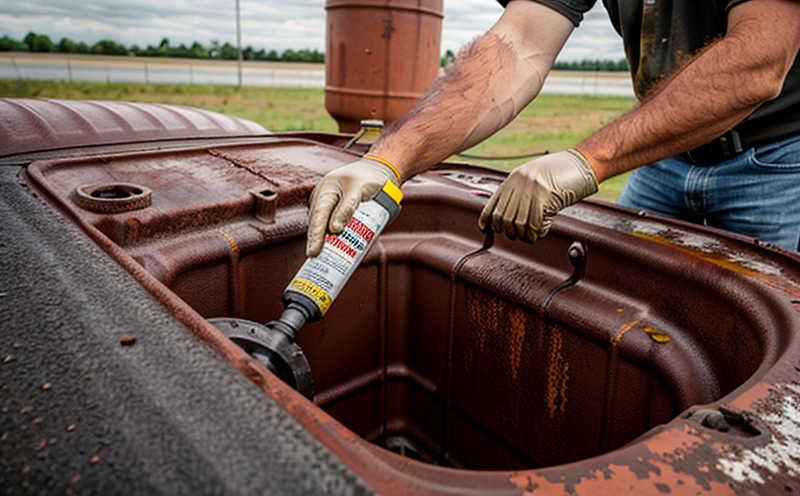Testing the effectiveness of rust inhibitors in automotive fluids and oils
The Importance of Testing Rust Inhibitors in Automotive Fluids and Oils A Game-Changer for Businesses
In the automotive industry, protecting vehicles from rust and corrosion is a top priority. However, with the rise of modern manufacturing techniques and the increasing complexity of vehicle components, its become more challenging to ensure that automotive fluids and oils effectively prevent rust and corrosion. This is where Testing the effectiveness of rust inhibitors in automotive fluids and oils comes into play a critical laboratory service provided by Eurolab.
In this article, well delve into the world of rust inhibitors and explore their significance for businesses operating in the automotive sector. Well discuss the advantages of testing the effectiveness of these inhibitors, highlighting key benefits and addressing common questions and concerns.
What is Testing the Effectiveness of Rust Inhibitors in Automotive Fluids and Oils?
Testing the effectiveness of rust inhibitors in automotive fluids and oils involves analyzing the performance of various additives designed to prevent corrosion and rust on metal surfaces. Eurolabs laboratory service utilizes advanced testing methods, including accelerated aging tests and electrochemical measurements, to assess the efficacy of these inhibitors.
Rust inhibitors are crucial components in many automotive fluids and oils, as they help protect vehicles from damage caused by moisture, salt, and other environmental factors. By ensuring that these inhibitors work effectively, businesses can minimize the risk of corrosion-related issues, reduce maintenance costs, and improve overall vehicle reliability.
Advantages of Testing Rust Inhibitors in Automotive Fluids and Oils
The advantages of testing rust inhibitors in automotive fluids and oils are numerous
Enhanced Vehicle Reliability By identifying effective rust inhibitors, businesses can ensure that vehicles operate reliably, with reduced risk of corrosion-related failures.
Increased Customer Satisfaction With improved vehicle performance and reliability, customers are more likely to be satisfied with their purchase or maintenance experience.
Reduced Maintenance Costs Effective rust inhibitors minimize the need for costly repairs and replacements, saving businesses money in the long run.
Compliance with Industry Regulations Testing rust inhibitors helps ensure that vehicles meet regulatory requirements, reducing the risk of non-compliance fines and reputational damage.
Competitive Advantage Companies that invest in testing their products effectiveness gain a competitive edge in the market, as they can offer superior-quality products to customers.
Key Benefits
Improved performance Effective rust inhibitors ensure that vehicles operate at peak performance levels, reducing maintenance costs and improving overall efficiency.
Extended product life By identifying reliable rust inhibitors, businesses can extend the lifespan of their products, reducing waste and minimizing environmental impact.
Reduced emissions Corrosion-related issues often lead to increased emissions, which can negatively impact air quality and contribute to climate change. Testing rust inhibitors helps minimize these risks.
Enhanced safety By preventing corrosion-related failures, businesses can ensure that vehicles remain safe for drivers and passengers.
QA Section
Weve addressed some common questions and concerns below
Q What types of rust inhibitors are tested by Eurolab?
A Our laboratory service tests various types of rust inhibitors, including those used in engine oils, gear oils, transmission fluids, and other automotive applications.
Q How do you test the effectiveness of rust inhibitors?
A We utilize advanced testing methods, such as accelerated aging tests and electrochemical measurements, to assess the performance of rust inhibitors.
Q What are the benefits of testing rust inhibitors in-house versus outsourcing to a laboratory service like Eurolab?
A While some companies may choose to test their products effectiveness in-house, outsourcing to a specialized laboratory service like Eurolab offers numerous advantages. Our experts have extensive knowledge and experience in testing rust inhibitors, ensuring accurate and reliable results.
Q How long does the testing process typically take?
A The length of time required for testing varies depending on the type of test and the specific requirements of each product. Our experienced team will work closely with you to ensure that your products are tested efficiently and effectively.
Conclusion
Testing the effectiveness of rust inhibitors in automotive fluids and oils is a critical service offered by Eurolab, helping businesses operating in the automotive sector minimize corrosion-related issues and improve overall vehicle reliability. By understanding the importance of this laboratory service, companies can make informed decisions about their product development and maintenance strategies, ultimately leading to increased customer satisfaction, reduced costs, and improved competitiveness.
Dont miss out on the benefits of testing your products effectiveness with Eurolabs expert team. Contact us today to learn more about our laboratory services and discover how we can help you protect your business from the risks associated with corrosion-related issues.




